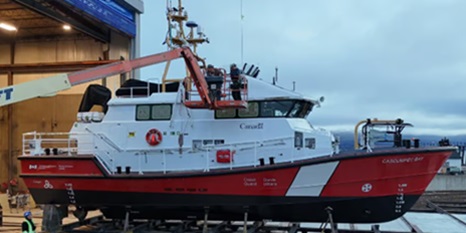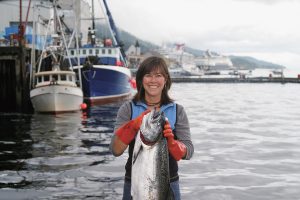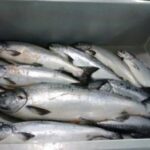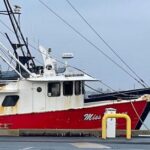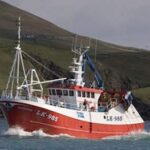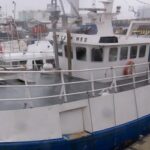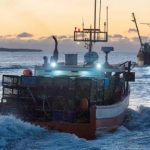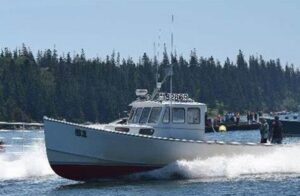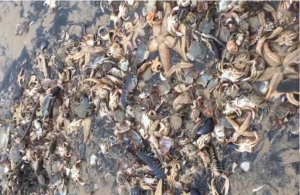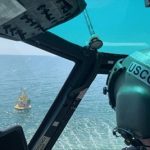Category Archives: Canada
Newfoundland and Labrador recorded its highest lobster landings ever this past season
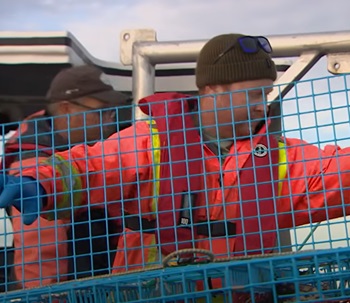 And so, this past spring, when I was hearing so much about the abundance of lobsters in our waters, I wanted to find out what was going on. I called around to several harvesters in various parts of the province to find out about their catch rates. The thing is, when lobsters are plentiful, lobster fishermen can be a tight-lipped bunch. I knew after a few phone calls, it would be hard to get anyone to go on camera for a Land & Sea show to brag about their bounty. And that was confirmed for me by Fortune Bay fisherman Alfred Fitzpatrick, who fishes out of Garnish on the Burin Peninsula. “Fellows will tell you they poached a moose before they tell you they caught a lobster. If you hauled 200 pots and you got 10 lobsters, and your brother asked you, you’d say, ‘Boy, I got five,'” explained Fitzpatrick. Video, more, >>CLICK TO READ<< 08:14
And so, this past spring, when I was hearing so much about the abundance of lobsters in our waters, I wanted to find out what was going on. I called around to several harvesters in various parts of the province to find out about their catch rates. The thing is, when lobsters are plentiful, lobster fishermen can be a tight-lipped bunch. I knew after a few phone calls, it would be hard to get anyone to go on camera for a Land & Sea show to brag about their bounty. And that was confirmed for me by Fortune Bay fisherman Alfred Fitzpatrick, who fishes out of Garnish on the Burin Peninsula. “Fellows will tell you they poached a moose before they tell you they caught a lobster. If you hauled 200 pots and you got 10 lobsters, and your brother asked you, you’d say, ‘Boy, I got five,'” explained Fitzpatrick. Video, more, >>CLICK TO READ<< 08:14
Nova Scotia: Safety Top Priority as Lobster Season Begins
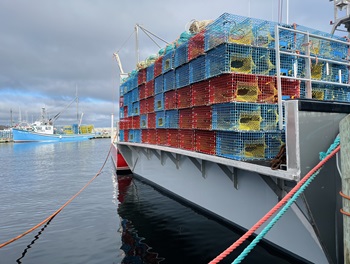 With the lobster season about to start, fishing crews in southwestern Nova Scotia are reminded to make safety a top priority. Dumping Day, as the first day of the season is known, will see thousands of lobster traps dumped along the south and western shores in lobster fishing areas 33 and 34. The start in both areas is weather dependent but is expected to be Monday, November 25. The Province urges fishers to take the time and necessary steps to stay safe. Fishing crews preparing to head out each day should: monitor the weather, assess their boats, check all vessel safety equipment to ensure it is inspected and accessible, prepare for emergencies. Occupational health and safety laws require all crew members to wear a life jacket or other personal flotation device. Links, more, >>CLICK TO READ<< 15:06
With the lobster season about to start, fishing crews in southwestern Nova Scotia are reminded to make safety a top priority. Dumping Day, as the first day of the season is known, will see thousands of lobster traps dumped along the south and western shores in lobster fishing areas 33 and 34. The start in both areas is weather dependent but is expected to be Monday, November 25. The Province urges fishers to take the time and necessary steps to stay safe. Fishing crews preparing to head out each day should: monitor the weather, assess their boats, check all vessel safety equipment to ensure it is inspected and accessible, prepare for emergencies. Occupational health and safety laws require all crew members to wear a life jacket or other personal flotation device. Links, more, >>CLICK TO READ<< 15:06
Two Dominican nationals sentenced for smuggling endangered juvenile eels from Puerto Rico
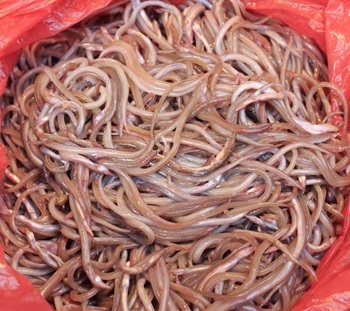 On Nov. 14, U.S. District Court Judge Aida M. Delgado-Colón sentenced Simón De la Cruz Paredes, 56, to 24 months in prison and two years of supervised release. On Thursday, Saúl Enrique José De la Cruz, 39, received the same sentence in the U.S. District Court for the District of Puerto Rico. Court documents revealed the pair spent months harvesting the juvenile eels in rivers near Levittown, Puerto Rico. The eels were kept alive using specialized oxygenation equipment while the defendants prepared a boat for the trip back to the Dominican Republic. On Feb. 21, they departed Puerto Rico with 30 kilograms of glass eels valued at $132,000, a handgun, and hundreds of rounds of ammunition. The U.S. Coast Guard intercepted the vessel about 40 miles from Puerto Rico after the men refused to comply with an order to stop. more, >>CLICK TO READ<< 09:27
On Nov. 14, U.S. District Court Judge Aida M. Delgado-Colón sentenced Simón De la Cruz Paredes, 56, to 24 months in prison and two years of supervised release. On Thursday, Saúl Enrique José De la Cruz, 39, received the same sentence in the U.S. District Court for the District of Puerto Rico. Court documents revealed the pair spent months harvesting the juvenile eels in rivers near Levittown, Puerto Rico. The eels were kept alive using specialized oxygenation equipment while the defendants prepared a boat for the trip back to the Dominican Republic. On Feb. 21, they departed Puerto Rico with 30 kilograms of glass eels valued at $132,000, a handgun, and hundreds of rounds of ammunition. The U.S. Coast Guard intercepted the vessel about 40 miles from Puerto Rico after the men refused to comply with an order to stop. more, >>CLICK TO READ<< 09:27
Dumping Day won’t be Monday in LFA 33/34
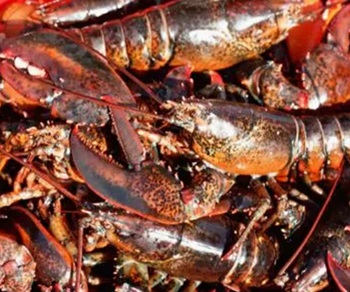 Dumping Day is delayed once again. It’s the day that hundreds of lobster fishing vessels head out to set their traps, marking the start of the commercial lobster fishery. Port representatives from Lobster Fishing Area 34, which includes Digby around Yarmouth to Shelburne County, and the Department of Fisheries and Oceans held a weather call Saturday morning to look at a potential opening for Monday. Due to high winds, the decision was a ‘no go’. more, >>CLICK TO READ<<08:46
Dumping Day is delayed once again. It’s the day that hundreds of lobster fishing vessels head out to set their traps, marking the start of the commercial lobster fishery. Port representatives from Lobster Fishing Area 34, which includes Digby around Yarmouth to Shelburne County, and the Department of Fisheries and Oceans held a weather call Saturday morning to look at a potential opening for Monday. Due to high winds, the decision was a ‘no go’. more, >>CLICK TO READ<<08:46
TSB says harsh weather, lack of contingency plan contributed to fatal vessel sinking
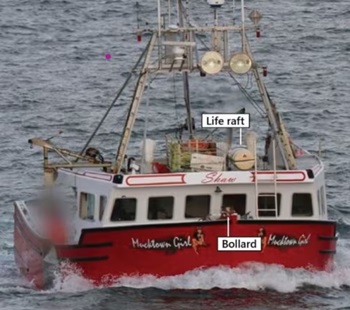 A fatal fishing vessel incident near Canso, N.S., in 2022 was caused in part by severe weather conditions and a lack of contingency planning for towing disabled vessels, according to the Transportation Safety Board of Canada. The board on Thursday released its investigative report into the rescue operation of the F/V Mucktown Girl, which resulted in the death of one of the halibut boat’s crew members and injuries to two Canadian Coast Guard crew. The Mucktown Girl, a 15-metre vessel with five people on board, was around 160 kilometres southeast of Canso when it experienced electrical problems and lost power late in the night on March 11, 2022. The crew contacted the Joint Rescue Coordination Centre in Halifax and the coast guard ship Jean Goodwill arrived the next morning. more, >>CLICK TO READ<< 08:08
A fatal fishing vessel incident near Canso, N.S., in 2022 was caused in part by severe weather conditions and a lack of contingency planning for towing disabled vessels, according to the Transportation Safety Board of Canada. The board on Thursday released its investigative report into the rescue operation of the F/V Mucktown Girl, which resulted in the death of one of the halibut boat’s crew members and injuries to two Canadian Coast Guard crew. The Mucktown Girl, a 15-metre vessel with five people on board, was around 160 kilometres southeast of Canso when it experienced electrical problems and lost power late in the night on March 11, 2022. The crew contacted the Joint Rescue Coordination Centre in Halifax and the coast guard ship Jean Goodwill arrived the next morning. more, >>CLICK TO READ<< 08:08
Safety board calls for changes two years after Nova Scotia fisherman’s death at sea
 An investigation into how the Canadian Coast Guard responded to a Nova Scotia vessel in distress two years ago raises questions about why one fisherman died after a towing operation went awry. In an investigation report released Thursday, the Transportation Safety Board says the fishing boat F/V Mucktown Girl was returning to Canso, N.S., with five crew aboard on March 11, 2022, when it was disabled by electrical problems. The captain called for a tow from the coast guard as a storm was closing in. After a seven-hour voyage, the Canadian Coast Guard Ship Jean Goodwill reached the drifting boat and attached a 300-metre tow line to the smaller vessel’s bollard. But as the weather turned rough, the bollard broke off six hours into the recovery mission. At that point, the decision was made to let the fishing crew ride out the storm aboard the F/V Mucktown Girl rather than attach another tow line that could damage the boat. more, >>CLICK TO READ<< 19:40
An investigation into how the Canadian Coast Guard responded to a Nova Scotia vessel in distress two years ago raises questions about why one fisherman died after a towing operation went awry. In an investigation report released Thursday, the Transportation Safety Board says the fishing boat F/V Mucktown Girl was returning to Canso, N.S., with five crew aboard on March 11, 2022, when it was disabled by electrical problems. The captain called for a tow from the coast guard as a storm was closing in. After a seven-hour voyage, the Canadian Coast Guard Ship Jean Goodwill reached the drifting boat and attached a 300-metre tow line to the smaller vessel’s bollard. But as the weather turned rough, the bollard broke off six hours into the recovery mission. At that point, the decision was made to let the fishing crew ride out the storm aboard the F/V Mucktown Girl rather than attach another tow line that could damage the boat. more, >>CLICK TO READ<< 19:40
After a dramatic decline, lake trout have recovered in most of Lake Superior
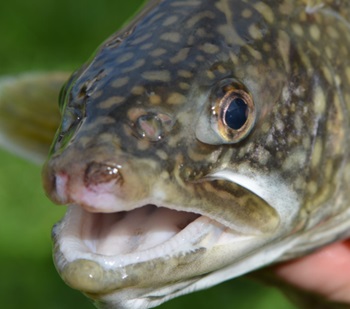 After decades of work, fishery managers say lake trout have fully recovered in most of Lake Superior after the invasive, fish-killing sea lamprey decimated their numbers. The Lake Superior Committee of the Great Lakes Fishery Commission, which is made up of state, tribal and Canadian natural resource managers, announced the population’s recovery Wednesday. The lake trout population in Lake Superior dropped to dramatically low levels during the mid-1900s due to overfishing and an invasion of sea lampreys, eel-like parasites that suck the blood of their hosts. The parasitic fish spread to the Great Lakes from the Atlantic Ocean, invading Lake Superior by 1938. more, >>CLICK TO READ<< 11:03
After decades of work, fishery managers say lake trout have fully recovered in most of Lake Superior after the invasive, fish-killing sea lamprey decimated their numbers. The Lake Superior Committee of the Great Lakes Fishery Commission, which is made up of state, tribal and Canadian natural resource managers, announced the population’s recovery Wednesday. The lake trout population in Lake Superior dropped to dramatically low levels during the mid-1900s due to overfishing and an invasion of sea lampreys, eel-like parasites that suck the blood of their hosts. The parasitic fish spread to the Great Lakes from the Atlantic Ocean, invading Lake Superior by 1938. more, >>CLICK TO READ<< 11:03

Dwan Street says FFAW won’t shy away from a fight as first woman to lead union takes reins
In a fiery introduction speech in front of members of the Fish, Food and Allied Workers union, new leader Dwan Street said Tuesday her presidency also marks the start of a new era in the Newfoundland and Labrador fishery. “One where our voices will become louder. Where we are not afraid to rattle cages. And from what I’m hearing, there are a few rattled right now,” Street said in Gander. Street, originally from Spillar’s Cove on the Bonavista Peninsula, was elected in July as the first woman to lead the union that represents about 15,000 people in Newfoundland and Labrador. She replaces former president Greg Pretty and takes the leadership as a time when the FFAW — a force in Newfoundland and Labrador labour, industry and politics for more than five decades — has been accused of not being tough enough in speaking up for members’ interests. High-profile protests earlier this year, for instance, were organized from outside the union’s leadership. Video, more >>CLICK TO READ<< 11:20
‘Dumping Day’ for southwest N.S. lobster season fast approaching
 Lobster fishers in southwestern Nova Scotia are ‘gearing’ up their boats. Dumping Day for fishing areas 33 and 34, which stretches from Digby around to Halifax is scheduled for Monday. Dan Fleck with the Brazil Rock 33/34 Lobster Association says weather calls with port reps and DFO begin this Friday. “Any winds greater than 26 knots in any direction within the area, DFO will implement a closure for the day. It’s also possible port reps can open or close it, depending on what is safest for all, as safety is most important,” said Fleck. more, >>CLICK TO READ<< 09:04
Lobster fishers in southwestern Nova Scotia are ‘gearing’ up their boats. Dumping Day for fishing areas 33 and 34, which stretches from Digby around to Halifax is scheduled for Monday. Dan Fleck with the Brazil Rock 33/34 Lobster Association says weather calls with port reps and DFO begin this Friday. “Any winds greater than 26 knots in any direction within the area, DFO will implement a closure for the day. It’s also possible port reps can open or close it, depending on what is safest for all, as safety is most important,” said Fleck. more, >>CLICK TO READ<< 09:04
FFAW says it wants to reclaim its right to strike — but only over snow crab
 The Newfoundland and Labrador government is opening the door for seafood harvesters in the province to reclaim their right to strike, but the harvesters’ union is signalling it only wants that right for a single species — a proposal that the fisheries minister says likely isn’t legal. Minister Gerry Byrne announced several proposed changes to fishing industry regulations Monday in what he billed as an effort to advance free enterprise. Those proposals included a green light from government to return to strikes and lockout processes when collective bargaining fails, and a move away from the final-offer selection model implemented in Newfoundland and Labrador two decades ago. Under the current model, the Fish, Food and Allied Workers union and Association of Seafood Producers both make offers about pricing and an independent arbitrator chooses between those offers, thus avoiding lockouts and strikes. more, >>CLICK TO READ<< 15:23
The Newfoundland and Labrador government is opening the door for seafood harvesters in the province to reclaim their right to strike, but the harvesters’ union is signalling it only wants that right for a single species — a proposal that the fisheries minister says likely isn’t legal. Minister Gerry Byrne announced several proposed changes to fishing industry regulations Monday in what he billed as an effort to advance free enterprise. Those proposals included a green light from government to return to strikes and lockout processes when collective bargaining fails, and a move away from the final-offer selection model implemented in Newfoundland and Labrador two decades ago. Under the current model, the Fish, Food and Allied Workers union and Association of Seafood Producers both make offers about pricing and an independent arbitrator chooses between those offers, thus avoiding lockouts and strikes. more, >>CLICK TO READ<< 15:23
Suggested areas for offshore wind around N.S. swell in size
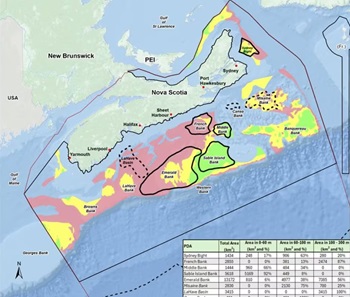 Offshore areas around Nova Scotia recommended for wind energy projects have ballooned in size in the latest version of a report for government, troubling some in the fishing industry who are bracing for disruptions. The draft final report comes from the regional assessment committee, which was tasked by the province and Ottawa two years ago to investigate the potential impacts of offshore wind development on Nova Scotia. It describes eight potential development areas that cover a total of 31,200 square kilometres. The areas stretch from the tip of George’s Bank southwest of Nova Scotia, up the Atlantic coastline and around Cape Breton Island. more, >>CLICK TO READ<< 08:14
Offshore areas around Nova Scotia recommended for wind energy projects have ballooned in size in the latest version of a report for government, troubling some in the fishing industry who are bracing for disruptions. The draft final report comes from the regional assessment committee, which was tasked by the province and Ottawa two years ago to investigate the potential impacts of offshore wind development on Nova Scotia. It describes eight potential development areas that cover a total of 31,200 square kilometres. The areas stretch from the tip of George’s Bank southwest of Nova Scotia, up the Atlantic coastline and around Cape Breton Island. more, >>CLICK TO READ<< 08:14
Court won’t overturn decision to cut quota from N.S., N.B. elver licence holders
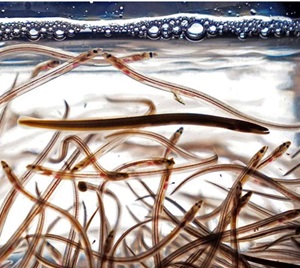 Three judges have delivered another blow to beleaguered commercial groups that fish for lucrative juvenile eels in the Maritimes, agreeing with a lower court ruling that upheld Ottawa’s 2022 decision to transfer a portion of their quota to First Nations without compensation. The Federal Court of Appeal heard arguments in the case last week in Halifax, and emerged with a decision that found the federal fisheries minister had “broad discretion” and had used it reasonably. Tien Nguyen, a pioneer in Canada’s fishery for young eels, also known as elvers, said he had hoped the judges would address the “absolute power” of the fisheries minister to make decisions that have enormous financial impact on licence holders. “It’s just like you build up the business, you struggle with it for a number of years, and when it’s finally successful, the government decided to take it away from you,” more, >>CLICK TO READ<< 15:40
Three judges have delivered another blow to beleaguered commercial groups that fish for lucrative juvenile eels in the Maritimes, agreeing with a lower court ruling that upheld Ottawa’s 2022 decision to transfer a portion of their quota to First Nations without compensation. The Federal Court of Appeal heard arguments in the case last week in Halifax, and emerged with a decision that found the federal fisheries minister had “broad discretion” and had used it reasonably. Tien Nguyen, a pioneer in Canada’s fishery for young eels, also known as elvers, said he had hoped the judges would address the “absolute power” of the fisheries minister to make decisions that have enormous financial impact on licence holders. “It’s just like you build up the business, you struggle with it for a number of years, and when it’s finally successful, the government decided to take it away from you,” more, >>CLICK TO READ<< 15:40
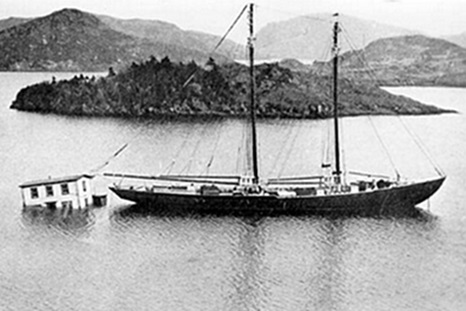
The 1929 Magnitude 7.2 “Grand Banks” earthquake and tsunami
On November 18, 1929, at 5:02 pm Newfoundland time, a major earthquake occurred approximately 250 km south of Newfoundland along the southern edge of the Grand Banks. This magnitude 7.2 tremor was felt as far away as New York and Montreal (see isoseismal map of felt area below). On land, damage due to earthquake vibrations was limited to Cape Breton Island where chimneys were overthrown or cracked and where some highways were blocked by minor landslides. A few aftershocks (one as large as magnitude 6) were felt in Nova Scotia and Newfoundland but caused no damage. More than 40 local villages in southern Newfoundland were affected, where numerous homes, ships, businesses, livestock and fishing gear were destroyed. Also lost were more than 280,000 pounds of salt cod. Total property losses were estimated at more than $1 million 1929 dollars (estimated as nearly $20 million 2004 dollars). Photos, maps, more, >>CLICK TO READ<< 10:23
DFO Affirms Canada’s Control Over Northern Cod Management
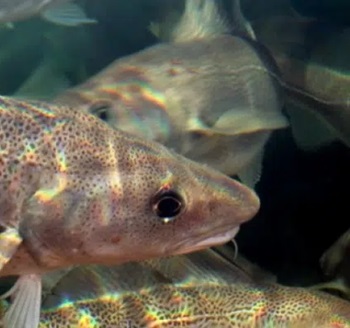 The Department of Fisheries and Oceans is weighing in following concerns raised about northern cod management by provincial fisheries minister Gerry Byrne. A recent EU news release suggested that North Atlantic Fishery Organization (NAFO) was making the management decisions when it came to northern cod, but DFO says there is no debate that Canada manages the stock. According to the federal department, Canada alone completes the scientific assessment of the stock and sets the annual total allowable catch. more, >>CLICK TO READ<< 07:31
The Department of Fisheries and Oceans is weighing in following concerns raised about northern cod management by provincial fisheries minister Gerry Byrne. A recent EU news release suggested that North Atlantic Fishery Organization (NAFO) was making the management decisions when it came to northern cod, but DFO says there is no debate that Canada manages the stock. According to the federal department, Canada alone completes the scientific assessment of the stock and sets the annual total allowable catch. more, >>CLICK TO READ<< 07:31
N.S. communities light up Christmas trees made of lobster traps
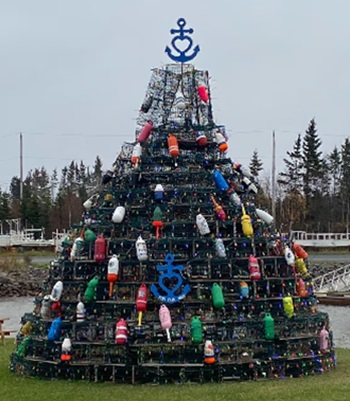 A uniquely Maritime holiday tradition is back across the region. Christmas trees made out of lobster traps have begun to pop up again across Nova Scotia. The first tree of this kind appears to have been built in Gloucester, Mass., in the early 2000s. In Nova Scotia, one of the first trap trees created was in Barrington in 2009. Since then, other communities have started to put up their own trees. Catherine Falconer of Toney River in Pictou County said she began putting up lobster tree traps in that community to mark a year after her son, Nick, died in November 2019 at the age of 24. more, >>CLICK TO READ<< 06:42
A uniquely Maritime holiday tradition is back across the region. Christmas trees made out of lobster traps have begun to pop up again across Nova Scotia. The first tree of this kind appears to have been built in Gloucester, Mass., in the early 2000s. In Nova Scotia, one of the first trap trees created was in Barrington in 2009. Since then, other communities have started to put up their own trees. Catherine Falconer of Toney River in Pictou County said she began putting up lobster tree traps in that community to mark a year after her son, Nick, died in November 2019 at the age of 24. more, >>CLICK TO READ<< 06:42
NEW EXECUTIVE BOARD SWEARING IN TUES NOV 19
 Please be advised that FFAW-Unifor is hosting its triennial Constitutional Convention next week at Quality Hotel and Suites in Gander. 160 delegates are registered to attend, representing all sectors of the Union. Monday, November 18 at 1:15PM: INSHORE PANEL Safety At Sea: Bringing Harvesters Home Safely with Craig Parsons (NL-FHSA), Terry Billard (Cheryl &Diane), Eugene Carter (Elite Navigator ‘Lucky 7’), Mark Gould (Coast Guard SAR) and MOD Sherry Glynn (FFAW) (SALON A/B). Tuesday, November 19 at 4:15PM: Swearing in of the New Executive Board and New President Speech more, >>CLICK TO READ<< 12:25
Please be advised that FFAW-Unifor is hosting its triennial Constitutional Convention next week at Quality Hotel and Suites in Gander. 160 delegates are registered to attend, representing all sectors of the Union. Monday, November 18 at 1:15PM: INSHORE PANEL Safety At Sea: Bringing Harvesters Home Safely with Craig Parsons (NL-FHSA), Terry Billard (Cheryl &Diane), Eugene Carter (Elite Navigator ‘Lucky 7’), Mark Gould (Coast Guard SAR) and MOD Sherry Glynn (FFAW) (SALON A/B). Tuesday, November 19 at 4:15PM: Swearing in of the New Executive Board and New President Speech more, >>CLICK TO READ<< 12:25
Lack of fishing prohibitions in ‘grey zone’ could pose risk for right whales, expert says
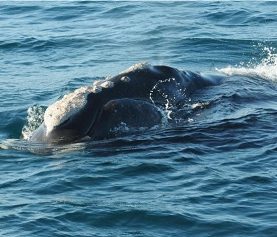 One marine conservation expert has questions about the efforts on the part of Fisheries and Oceans after North Atlantic right whales were detected in the Bay of Fundy in recent weeks, including in an area where both Canadian and American fishermen catch lobster. In October, Fisheries and Oceans announced several temporary prohibited fishing areas as the whales were detected in multiple fishing spots across the Maritimes, including in the bay. Some fishing prohibitions for parts of the Bay of Fundy started on Oct. 25 and included the fisheries for crab, herring, mackerel, groundfish, hagfish and lobster. The so-called “grey zone” is an area of disputed water near Grand Manan. Both Canada and the United States have claimed sovereignty over the area, so fishers from both countries harvest there. more, >>CLICK TO READ<< 07:57
One marine conservation expert has questions about the efforts on the part of Fisheries and Oceans after North Atlantic right whales were detected in the Bay of Fundy in recent weeks, including in an area where both Canadian and American fishermen catch lobster. In October, Fisheries and Oceans announced several temporary prohibited fishing areas as the whales were detected in multiple fishing spots across the Maritimes, including in the bay. Some fishing prohibitions for parts of the Bay of Fundy started on Oct. 25 and included the fisheries for crab, herring, mackerel, groundfish, hagfish and lobster. The so-called “grey zone” is an area of disputed water near Grand Manan. Both Canada and the United States have claimed sovereignty over the area, so fishers from both countries harvest there. more, >>CLICK TO READ<< 07:57
Fisheries Minister Taken Aback by EU Boast that NAFO Has Management of Northern Cod Fishery
 The province’s fisheries minister is encouraging Newfoundlanders and Labradorians to rally for joint management of the stocks off the province’s coast after learning that NAFO has taken control of management of the northern cod fishery. A recent European Union release following Northwest Atlantic Fisheries Organization meetings in Halifax indicates that based on an EU-Canada proposal on northern cod, NAFO “reopened the fishery and established a revised sharing arrangement.” It goes on to say that “it was fair and necessary to increase the EU share to reflect the current composition of the EU.” The release also indicates that NAFO is increasing fishing opportunities for 3M cod outside Canada’s 200 mile limit. more, >>CLICK TO READ<< 09:08
The province’s fisheries minister is encouraging Newfoundlanders and Labradorians to rally for joint management of the stocks off the province’s coast after learning that NAFO has taken control of management of the northern cod fishery. A recent European Union release following Northwest Atlantic Fisheries Organization meetings in Halifax indicates that based on an EU-Canada proposal on northern cod, NAFO “reopened the fishery and established a revised sharing arrangement.” It goes on to say that “it was fair and necessary to increase the EU share to reflect the current composition of the EU.” The release also indicates that NAFO is increasing fishing opportunities for 3M cod outside Canada’s 200 mile limit. more, >>CLICK TO READ<< 09:08
Cuban-born net maker shares his journey from Havana to New Bedford’s working waterfront
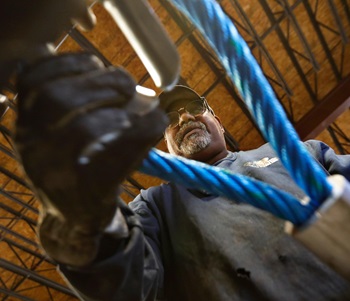 When he had his chance, Cuban-born net maker Miguel Sanchez escaped his home country, jumping from a Cuban fishing boat aboard a ship heading to Canada. The young law student escaped to start a new life, far away from Cuba and its oppressive dictatorship, the only member of his family to escape. Sanchez left Havana abruptly on March 24, 1996, before heading to Canada, arriving in Nova Scotia on April 15, 1996. A year ago, after spending more than 20 years in Nova Scotia, he got a call to work at Reidar’s Manufacturing on the New Bedford waterfront. His skills as a net maker were in demand. Sanchez worked in Nova Scotia for more than 20 years for different fishing companies under the country’s International Mobility Program, teaching and working with wire rope, when he got the call to work at Reidar’s Trawl Gear. more, >>CLICK TO READ<< 06:31
When he had his chance, Cuban-born net maker Miguel Sanchez escaped his home country, jumping from a Cuban fishing boat aboard a ship heading to Canada. The young law student escaped to start a new life, far away from Cuba and its oppressive dictatorship, the only member of his family to escape. Sanchez left Havana abruptly on March 24, 1996, before heading to Canada, arriving in Nova Scotia on April 15, 1996. A year ago, after spending more than 20 years in Nova Scotia, he got a call to work at Reidar’s Manufacturing on the New Bedford waterfront. His skills as a net maker were in demand. Sanchez worked in Nova Scotia for more than 20 years for different fishing companies under the country’s International Mobility Program, teaching and working with wire rope, when he got the call to work at Reidar’s Trawl Gear. more, >>CLICK TO READ<< 06:31
Canada’s largest lobster fishery set to begin amid threat of Trump tariffs
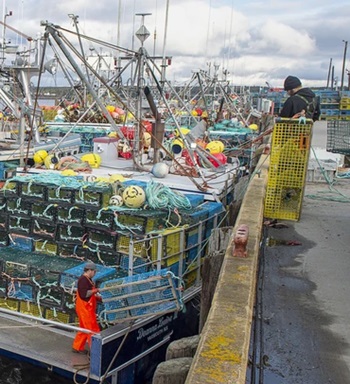 Trump’s inauguration is still a couple of months away, he officially takes office on Jan. 20, but fishermen are trying to take the threat in stride while preparing for the season to open Nov. 25. “People are concerned, but until it happens, we’ll just carry on,” Geoff Irvine, executive director of the Lobster Council of Canada, said. “There’s not a lot we can do to prepare and speculating on what it could mean doesn’t really get us anywhere.” As a result, the stakes are high if U.S. president-elect Donald Trump makes good on his campaign promise to impose duties of between 10 per cent and 20 per cent on all imported goods. While fishermen are worried about how this will play out, he said they have more immediate concerns on their minds. “What’s the catch going to be like?” he said. “What’s the price of lobster going to be like? What’s the weather going to be like? “more, >>CLICK TO READ<< 15:26
Trump’s inauguration is still a couple of months away, he officially takes office on Jan. 20, but fishermen are trying to take the threat in stride while preparing for the season to open Nov. 25. “People are concerned, but until it happens, we’ll just carry on,” Geoff Irvine, executive director of the Lobster Council of Canada, said. “There’s not a lot we can do to prepare and speculating on what it could mean doesn’t really get us anywhere.” As a result, the stakes are high if U.S. president-elect Donald Trump makes good on his campaign promise to impose duties of between 10 per cent and 20 per cent on all imported goods. While fishermen are worried about how this will play out, he said they have more immediate concerns on their minds. “What’s the catch going to be like?” he said. “What’s the price of lobster going to be like? What’s the weather going to be like? “more, >>CLICK TO READ<< 15:26
Why Canada’s decision to lift a ban on cod fishing in Newfoundland after 32 years is so controversial – Podcast
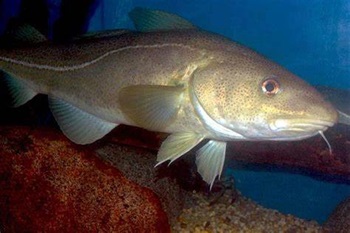 For generations, cod fishing was a way of life in Newfoundland and Labrador, the easternmost province in Canada. But in 1992, after cod stocks in the north Atlantic plummeted, the federal government imposed a moratorium on cod fishing. It was to last for 32 years until it was lifted in June 2024. Fishing has been the backbone of the economy for centuries, and so when the Canadian government imposed a cod moratorium in 1992 it had a huge impact, with an estimated 30,000 people in Newfoundland and Labrador out of work overnight. Some cod fishing was permitted in inshore waters from the late 1990s in boats less than 20 metres long, but all commercial offshore trawler fishing was prohibited. Links, more, >>CLICK TO READ<< 11:48
For generations, cod fishing was a way of life in Newfoundland and Labrador, the easternmost province in Canada. But in 1992, after cod stocks in the north Atlantic plummeted, the federal government imposed a moratorium on cod fishing. It was to last for 32 years until it was lifted in June 2024. Fishing has been the backbone of the economy for centuries, and so when the Canadian government imposed a cod moratorium in 1992 it had a huge impact, with an estimated 30,000 people in Newfoundland and Labrador out of work overnight. Some cod fishing was permitted in inshore waters from the late 1990s in boats less than 20 metres long, but all commercial offshore trawler fishing was prohibited. Links, more, >>CLICK TO READ<< 11:48
Athearn Marine Agency Boat of the Week: 57′ Fiberglass Crabber/Groundfish/ Scalloper, Caterpillar 3406
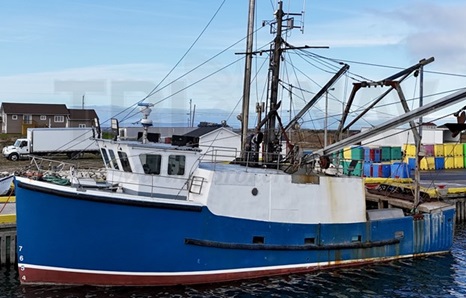 To review specifications, information, with 33 photos’,>click here< To see all the boats in this series, >click here<. 06:50
To review specifications, information, with 33 photos’,>click here< To see all the boats in this series, >click here<. 06:50
MLA calls for fishing industry to have mandatory WCB insurance coverage
 After a North Lake lobster fisher was killed this summer, Green MLA Peter Bevan-Baker is pushing for more to be done to compensate injured workers in the P.E.I. fishing industry. “The nature of the job is such that it’s an inherently very, very dangerous situation,” he said Thursday. “I think there’s a limit to how much can be done. I think absolutely we should be doing everything we can to make sure that conditions onboard boats are as safe as they possibly can be.” But when safety procedures don’t prevent injuries or deaths, fishery workers don’t have the same access to compensation as employees in other sectors, he said. That’s because paying premiums into the Workers Compensation Board (WBC) insurance system is optional for fishing industry employers. Bevan-Baker is calling on the provincial government to change that and make coverage mandatory. more, >>CLICK TO READ<< 10:12
After a North Lake lobster fisher was killed this summer, Green MLA Peter Bevan-Baker is pushing for more to be done to compensate injured workers in the P.E.I. fishing industry. “The nature of the job is such that it’s an inherently very, very dangerous situation,” he said Thursday. “I think there’s a limit to how much can be done. I think absolutely we should be doing everything we can to make sure that conditions onboard boats are as safe as they possibly can be.” But when safety procedures don’t prevent injuries or deaths, fishery workers don’t have the same access to compensation as employees in other sectors, he said. That’s because paying premiums into the Workers Compensation Board (WBC) insurance system is optional for fishing industry employers. Bevan-Baker is calling on the provincial government to change that and make coverage mandatory. more, >>CLICK TO READ<< 10:12
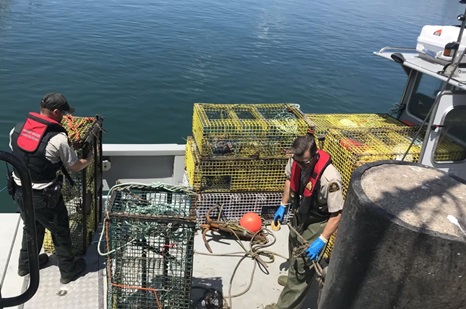
Federal memo estimates more than $176M of Atlantic lobster catch unreported, untaxed
The federal Department of Fisheries and Oceans suspects hundreds of millions of dollars’ worth of lobster is caught in Atlantic Canadian waters each year but never reported to authorities, raising both tax evasion and conservation implications in the country’s largest fishery. An internal memo in August to DFO’s deputy minister said it’s estimated that between 10 and 30 per cent of lobster landings in the region are unreported, and the department said in a statement it is working to map out criminal networks and money laundering in the sector. “It’s mind-boggling,” said Osborne Burke, the president of the Nova Scotia Seafood Alliance, which represents about 150 lobster buyers and processors and has urged a crackdown on unreported cash sales. more, >>CLICK TO READ<< 06:44
DFO Standing Committee Tables Report on Illegal, Unreported and Unregulated Fishing
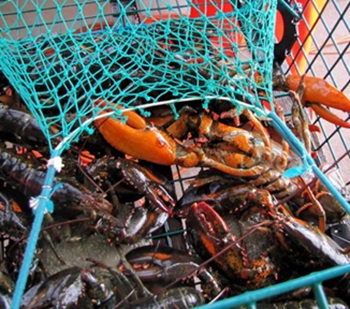 The Standing Committee on Fisheries and Oceans has made 32 recommendations to the federal government in its report, Reducing the Harms Caused to Canadian Fish Stocks by Illegal, Unreported and Unregulated (IUU) Fishing, tabled in the House of Commons on Oct. 3. “During its study, the Committee identified gaps that need to be addressed by DFO in order for DFO to have a fully informed response to IUU fishing. For example, more needs to be done to determine how much IUU fishing is taking place, intelligence-gathering and sharing needs to be improved and enforcement actions in relation to IUU fishing need to be strengthened, including in relation to the role of organized crime,” concluded the report. more, >>CLICK TO READ<< 08:12
The Standing Committee on Fisheries and Oceans has made 32 recommendations to the federal government in its report, Reducing the Harms Caused to Canadian Fish Stocks by Illegal, Unreported and Unregulated (IUU) Fishing, tabled in the House of Commons on Oct. 3. “During its study, the Committee identified gaps that need to be addressed by DFO in order for DFO to have a fully informed response to IUU fishing. For example, more needs to be done to determine how much IUU fishing is taking place, intelligence-gathering and sharing needs to be improved and enforcement actions in relation to IUU fishing need to be strengthened, including in relation to the role of organized crime,” concluded the report. more, >>CLICK TO READ<< 08:12
Commercial fishers seek $10 million in damages against ‘illegal’ N.S. lobster buyers
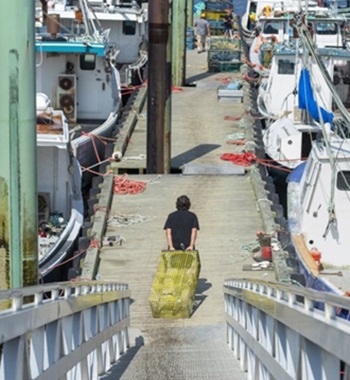 A commercial lobster fishing group in Nova Scotia has gone to court seeking $10 million in damages against those it alleges are buying lobster caught illegally in St. Mary’s Bay. The Unified Fisheries Conservation Alliance filed notice in the Supreme Court of Nova Scotia on Tuesday against Independent Fisheries Limited of Little Harbour, N.S., and its president Xiaoming Mao. The alliance is also suing the owners and operators of Fisher Direct Ltd. and Seawell Holdings Ltd., both based in Shag Harbour, N.S. The allegations have not been proven in court, and the defendants either declined to comment or were not immediately available to respond today. more, >>CLICK TO READ<< 12:28
A commercial lobster fishing group in Nova Scotia has gone to court seeking $10 million in damages against those it alleges are buying lobster caught illegally in St. Mary’s Bay. The Unified Fisheries Conservation Alliance filed notice in the Supreme Court of Nova Scotia on Tuesday against Independent Fisheries Limited of Little Harbour, N.S., and its president Xiaoming Mao. The alliance is also suing the owners and operators of Fisher Direct Ltd. and Seawell Holdings Ltd., both based in Shag Harbour, N.S. The allegations have not been proven in court, and the defendants either declined to comment or were not immediately available to respond today. more, >>CLICK TO READ<< 12:28
New guidelines for boat gear in place after June death of lobster fisherman
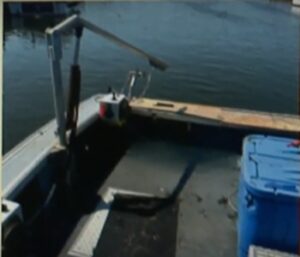 New guidelines have been released to help protect P.E.I. fishing crews after a man was killed by a boom on a North Lake lobster boat this past June. Occupational health and safety officials spent months looking into the incident and hope their review will prevent further accidents. The investigation is now complete, but officials have not said whether there will be charges or fines related to the death. The man was underneath a boom being used to hoist out lobster traps when it suddenly lowered and struck him in the head and shoulder. In July, the Workers Compensation Board released a hazard alert highlighting the possible risks of using booms on lobster boats. Photos, Video, more, >>CLICK TO READ<< 19:38
New guidelines have been released to help protect P.E.I. fishing crews after a man was killed by a boom on a North Lake lobster boat this past June. Occupational health and safety officials spent months looking into the incident and hope their review will prevent further accidents. The investigation is now complete, but officials have not said whether there will be charges or fines related to the death. The man was underneath a boom being used to hoist out lobster traps when it suddenly lowered and struck him in the head and shoulder. In July, the Workers Compensation Board released a hazard alert highlighting the possible risks of using booms on lobster boats. Photos, Video, more, >>CLICK TO READ<< 19:38






